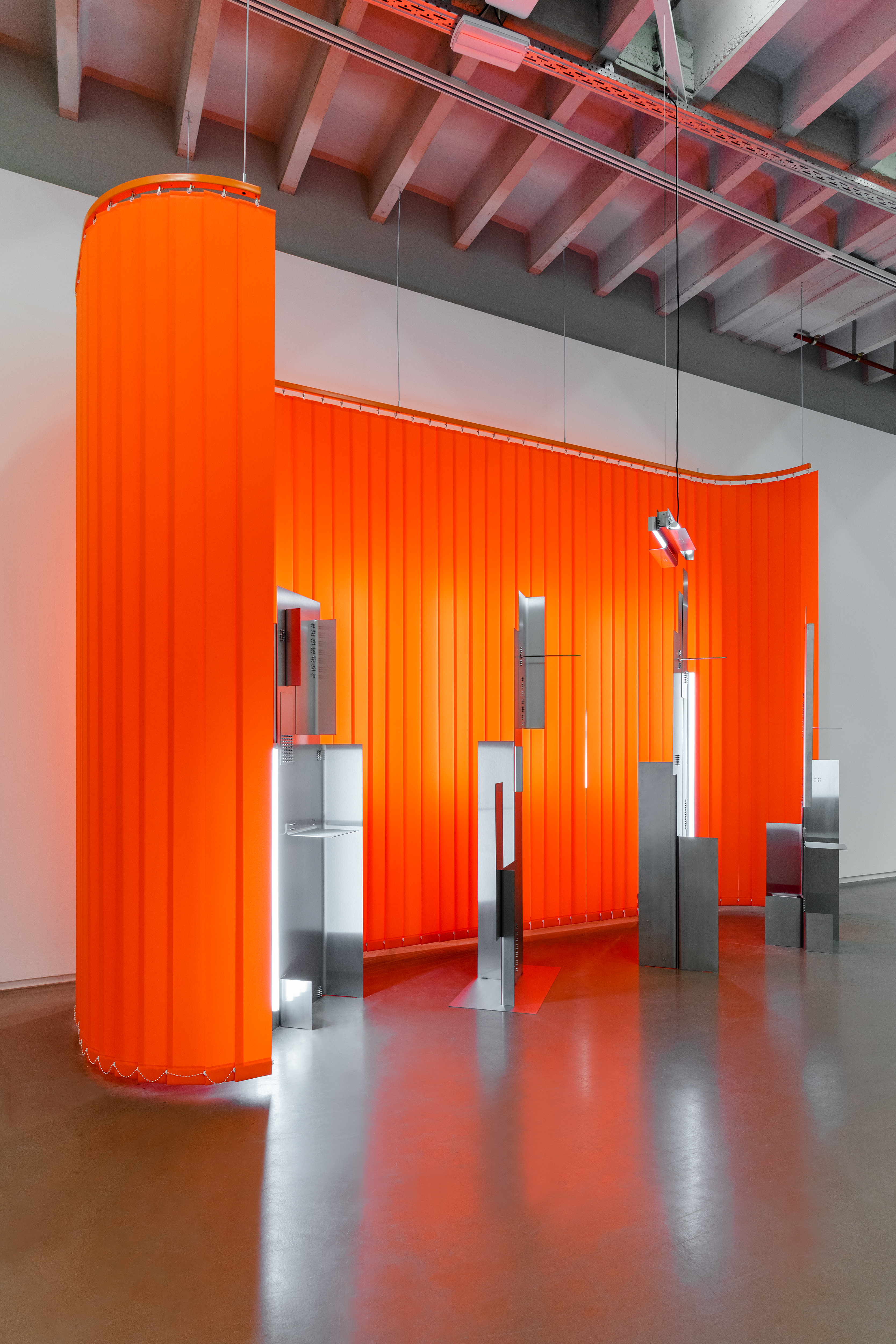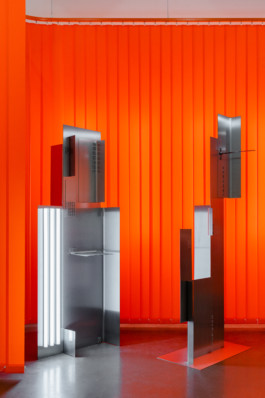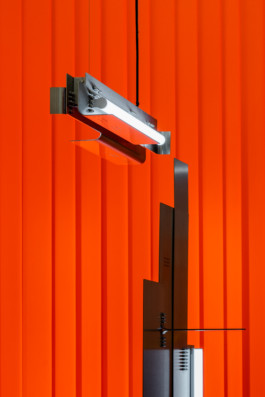



Paf Atelier for COLLECTIBLE 2022. © Ligia Poplawska
COLLECTIBLE In-Depth
July 2022
This new series, COLLECTIBLE In-Depth, unveil the backstage of contemporary creation. Tackling various topics from personal designer processes to the position of collectible design on the global design market; these COLLECTIBLE In-Depth offer different views to suit all tastes. Today we talk with Christopher Dessus from Paf Atelier.
COLLECTIBLE: What do you think collectible design brings compared to other more massively produced pieces?
Christopher Dessus: This type of design allows us to create new moments of creation, capable of supporting uses very different from mass production uses. In our studio, we have always desired to create a bridge between design and production, whether the work be an object or a space. The project always begins with production in mind. These durable objects are designed to evolve in a more or less extended temporality. Mass production is a design tool in the same way as the production of limited edition pieces. These two design tools differ in the object’s production process and how it functionality is envisioned. Similarly, there is a richness in the production process of limited edition design, which some designers approach in innovative and intelligent ways. For us, producing a "collectible" design piece is to present an intermediate stage, a prototyped object whose form and uses can still evolve.
The studio aims to question the conditions of architectural practice, from creation to production.
C: Can you talk about a book you recently read that inspires you?
Christopher Dessus: What comes to mind is the reissue of Victor J. Papanek s ‘Design for a Real World’. For several reasons, his work of writing and design criticism establishes a visceral vision of the design practice. Time and time again, he develops a contemporary theory whose issues apply to our time: climate disruption, the object practice and its excessive production, the power of the designer’s ego, design as a misunderstood practice, and many more. This work represents a vision already widely defended in many exhibitions. It is always interesting to reread a well-known piece of literature to see how it resonates in a context that differs from its creation.
C: Can you talk about a new piece / collection that you release for COLLECTIBLE this year?
Christopher Dessus: For our showcase at this year’s Collectible fair in Brussels, the workshop presented several object prototypes resulting from previous design work. Initially conceived for a clothing brand, the studio has developed a more global approach around a collection of five pieces: four standing elements and one suspended element. These versatile objects, sometimes lights, displays, or mysterious steel objects, refer to slender architectures; American metropolis skylines. They embody robotic dancers made of neon LEDs and bolts. The articulation of the stainless steel plates reflects the light and summons the industrial imagination. Dismountable, all the parts of the objects are removable but constrained by the question of their global balance: both physical and aesthetic.
C: How do sustainability-related questions influence your practice?
Christopher Dessus: From the beginning, this is an essential component of our project’s design. We like to create starting from production data, context, or artistic direction. The ecological part is always considered from the beginning or proposed to our clients. The durability of the objects is a major aspect of our work and is very often involved in its approach : its dismantlability, its transportability, its storage, its versatility.

Paf Atelier for COLLECTIBLE 2022. © Ligia Poplawska

Paf Atelier for COLLECTIBLE 2022. © Ligia Poplawska
About Paf Atelier
Based in Paris, Paf Atelier is a creative studio specialized in architecture and scenography. Driven by experimentation and research in the fields of art, design and architecture, Christopher Dessus, Architect DE, scenographer, curator and director of the Pli association (magazine and workshop) created the atelier in 2017. The studio aims to question the conditions of architectural practice, from creation to production. Each project signed by the studio is a balanced research between knowledge and skill, theory and practice, in which design and production cannot be considered one without the other.
COLLECTIBLE In-Depth
July 2022

Paf Atelier for COLLECTIBLE 2022. © Ligia Poplawska
This new series, COLLECTIBLE In-Depth, unveil the backstage of contemporary creation. Tackling various topics from personal designer processes to the position of collectible design on the global design market; these COLLECTIBLE In-Depth offer different views to suit all tastes. Today we talk with Christopher Dessus from Paf Atelier.
COLLECTIBLE: What do you think collectible design brings compared to other more massively produced pieces?
Christopher Dessus: This type of design allows us to create new moments of creation, capable of supporting uses very different from mass production uses. In our studio, we have always desired to create a bridge between design and production, whether the work be an object or a space. The project always begins with production in mind. These durable objects are designed to evolve in a more or less extended temporality. Mass production is a design tool in the same way as the production of limited edition pieces. These two design tools differ in the object’s production process and how it functionality is envisioned. Similarly, there is a richness in the production process of limited edition design, which some designers approach in innovative and intelligent ways. For us, producing a "collectible" design piece is to present an intermediate stage, a prototyped object whose form and uses can still evolve.
The studio aims to question the conditions of architectural practice, from creation to production.
C: Can you talk about a book you recently read that inspires you?
Christopher Dessus: What comes to mind is the reissue of Victor J. Papanek s ‘Design for a Real World’. For several reasons, his work of writing and design criticism establishes a visceral vision of the design practice. Time and time again, he develops a contemporary theory whose issues apply to our time: climate disruption, the object practice and its excessive production, the power of the designer’s ego, design as a misunderstood practice, and many more. This work represents a vision already widely defended in many exhibitions. It is always interesting to reread a well-known piece of literature to see how it resonates in a context that differs from its creation.
C: Can you talk about a new piece / collection that you release for COLLECTIBLE this year?
Christopher Dessus: For our showcase at this year’s Collectible fair in Brussels, the workshop presented several object prototypes resulting from previous design work. Initially conceived for a clothing brand, the studio has developed a more global approach around a collection of five pieces: four standing elements and one suspended element. These versatile objects, sometimes lights, displays, or mysterious steel objects, refer to slender architectures; American metropolis skylines. They embody robotic dancers made of neon LEDs and bolts. The articulation of the stainless steel plates reflects the light and summons the industrial imagination. Dismountable, all the parts of the objects are removable but constrained by the question of their global balance: both physical and aesthetic.
C: How do sustainability-related questions influence your practice?
Christopher Dessus: From the beginning, this is an essential component of our project’s design. We like to create starting from production data, context, or artistic direction. The ecological part is always considered from the beginning or proposed to our clients. The durability of the objects is a major aspect of our work and is very often involved in its approach : its dismantlability, its transportability, its storage, its versatility.

Paf Atelier for COLLECTIBLE 2022. © Ligia Poplawska

Paf Atelier for COLLECTIBLE 2022. © Ligia Poplawska
About Paf Atelier
Based in Paris, Paf Atelier is a creative studio specialized in architecture and scenography. Driven by experimentation and research in the fields of art, design and architecture, Christopher Dessus, Architect DE, scenographer, curator and director of the Pli association (magazine and workshop) created the atelier in 2017. The studio aims to question the conditions of architectural practice, from creation to production. Each project signed by the studio is a balanced research between knowledge and skill, theory and practice, in which design and production cannot be considered one without the other.
Contact
info@collectible.design
VIP PORTAL
EXHIBITOR PORTAL
PRIVACY POLICY
© 2025 Collectible
Contact
info@collectible.design
VIP PORTAL
EXHIBITOR PORTAL
PRIVACY POLICY
© 2025 Collectible